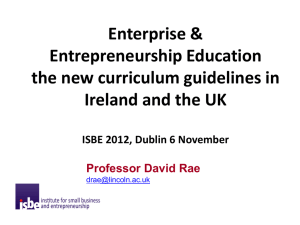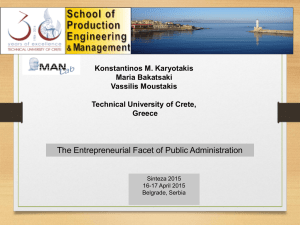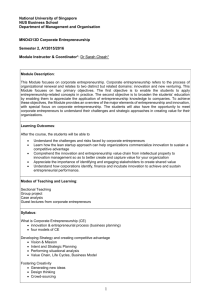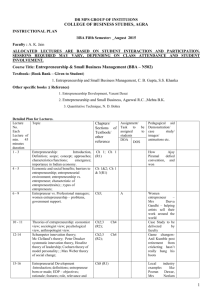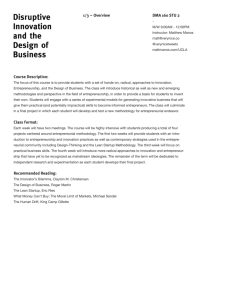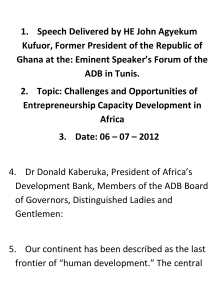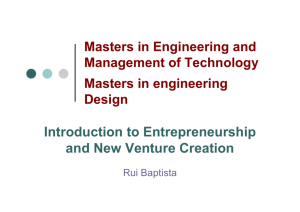If you can lead a horse to water…
advertisement
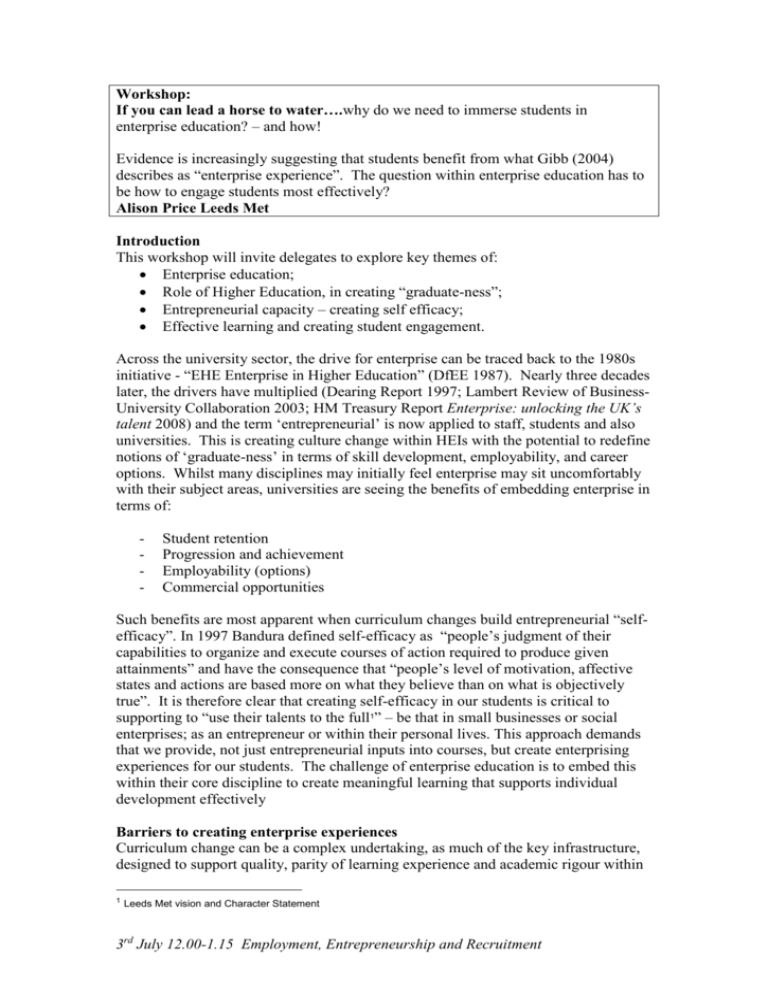
Workshop: If you can lead a horse to water….why do we need to immerse students in enterprise education? – and how! Evidence is increasingly suggesting that students benefit from what Gibb (2004) describes as “enterprise experience”. The question within enterprise education has to be how to engage students most effectively? Alison Price Leeds Met Introduction This workshop will invite delegates to explore key themes of: Enterprise education; Role of Higher Education, in creating “graduate-ness”; Entrepreneurial capacity – creating self efficacy; Effective learning and creating student engagement. Across the university sector, the drive for enterprise can be traced back to the 1980s initiative - “EHE Enterprise in Higher Education” (DfEE 1987). Nearly three decades later, the drivers have multiplied (Dearing Report 1997; Lambert Review of BusinessUniversity Collaboration 2003; HM Treasury Report Enterprise: unlocking the UK’s talent 2008) and the term ‘entrepreneurial’ is now applied to staff, students and also universities. This is creating culture change within HEIs with the potential to redefine notions of ‘graduate-ness’ in terms of skill development, employability, and career options. Whilst many disciplines may initially feel enterprise may sit uncomfortably with their subject areas, universities are seeing the benefits of embedding enterprise in terms of: - Student retention Progression and achievement Employability (options) Commercial opportunities Such benefits are most apparent when curriculum changes build entrepreneurial “selfefficacy”. In 1997 Bandura defined self-efficacy as “people’s judgment of their capabilities to organize and execute courses of action required to produce given attainments” and have the consequence that “people’s level of motivation, affective states and actions are based more on what they believe than on what is objectively true”. It is therefore clear that creating self-efficacy in our students is critical to supporting to “use their talents to the full1” – be that in small businesses or social enterprises; as an entrepreneur or within their personal lives. This approach demands that we provide, not just entrepreneurial inputs into courses, but create enterprising experiences for our students. The challenge of enterprise education is to embed this within their core discipline to create meaningful learning that supports individual development effectively Barriers to creating enterprise experiences Curriculum change can be a complex undertaking, as much of the key infrastructure, designed to support quality, parity of learning experience and academic rigour within 1 Leeds Met vision and Character Statement 3rd July 12.00-1.15 Employment, Entrepreneurship and Recruitment Higher Education, can limit the opportunities for innovation and change within curriculum design. Key barriers to curriculum change are identified as: Institutional Discipline Pedagogic Personal With enterprise education is defined as “an inclusive concept which provides both the context in which subject disciplines can be explored as well as an approach to learning (learning philosophy), which can be taken to the exploration and discovery of a discipline. In this respect, it can provide a challenging environment within which to explore a variety of teaching areas (such as a small business context) as well as providing a new and stimulating dimension to learning - that of being enterprising” (Price 2004). This challenge is met across disciplines through the creation of rich learning experiences, incorporating challenges; competitions; small group working which incorporates externals; peer group; guest speakers and experts. Having overcome these barriers it can be difficult for staff when student feedback during the semester sounds like this: “I don’t know why we are doing this?” “I don’t understand where this fits?” “I felt that group work at level 3 was risky” “my team don’t turn up – what’s the point?” “Before attending university I had no idea about enterprise, what it was and the importance of understanding it. My passion lies within community work & volunteering, so why would this be relevant? However it is clear, if only anecdotally, that teaching staff find non-attendance to be more de-moralising than such student questions. It is clear that limited student attendance and course engagement can be seen reflected within student marks2 and listed as first within Pickford and Race (2007)” “ten indicators of excellent learning”, is “participating fully in lectures, tutorials and other teaching-learning contexts”(p17). So the final challenge is therefore to improve student engagement in enterprise education throughout the course – and the key question, what creates engagement and participation? Race (2005) suggests effective learning stems from: Wanting to learn Learning by doing Learning through feedback Making sense of what has been learned. How to immerse These key factors link clearly to the aspiration of creating integrated enterprise experiences and can be established through thoughtful curriculum change. 2 Evidenced by exploration of log books (indicating engagement and attendance) against marks in enterprise modules. 3rd July 12.00-1.15 Employment, Entrepreneurship and Recruitment Key (Race 05) Want to learn Learning by doing Making Sense Feedback Creating Immersion in Enterprise Education How Why Embedded Enterprise Create connection Experiences Creates c Embedded Enterprise Create context Experiences Create confidence Develop Skills / knowledge Feelings/ behaviour Application / relevance Self-efficacy Evidence of these approaches can be found in our students reflective voices. Want to learn Learning by doing Making Sense Feedback Student Voice 2008 “When I began university, I had little knowledge of entrepreneurship, just assuming it was people who set up their own businesses. I never had the ambition to become an entrepreneur and believed it was a world I would never become a part of. Then in the final year of my degree, I was taught a module called ‘Entrepreneurship & Business Development’ and my thinking began to change. It appeared the world of enterprise was actually a lot more accessible than I had imagined everyday people could become entrepreneurs, whatever their background or situation. Although luck may play a part, successful enterprises are run by those often sharing particular personality traits and with enough drive and ambition, anyone possessing these characteristics could be entrepreneurial.” “Entrepreneurship and Business Development’ was the best course I had in this year. The module tutors infected us from the very first moment on with their enthusiastic way of presenting the subject matter. I felt perfectly integrated in the course and in the topic. Even though I didn’t plan to start my own business before I took the course, it took away the fear of thinking about new ideas and possibilities to solve problems in future business life. At the same time it was not the kind of course where you thought you have to take part but you liked to join (even if it was at 9 o’clock in the morning) ;-) The word enterprise used to mean nothing to me …[following curriculum input]…As a result I have started to utilise more and more of my enterprising skills, by advising my brothers (who are both self-employed) how to write a business plan to maintain competitive advantage and most importantly, knowing what figures help you remain solvent! In terms of community and volunteering, it is equally, if not more important to have an understanding of businesses priorities, in order to communicate in a way they recognise so that you might obtain and maintain sponsorship or funding. “Before attending university I had no idea about enterprise, what it was and the importance of understanding it. My passion lies within community work & volunteering so why would this be relevant? ………….Suffice to say now I can't believe how I ever coped without! “ “Today I have realised that each event manager somehow needs to have an enterprising desire and the characteristics to create and innovate in the job. Personally, I came to realise that although I might not be the risk-taker I still own some characteristics of an entrepreneur. This knowledge provides me now with confidence for the future and the things that lie ahead.” External (“dragon”) “I thoroughly enjoyed the day. Although we tried to re-create the “Dragon’s Den” atmosphere I would like to think we were not as nasty as the Dragons and more constructive in our comments. I was very impressed with the standard of the business plans presented.” This was a new experience as I found myself once again pushing myself to excel in an environment that I find not only interesting but rewarding. To work within an Events company such as THA rather than theories in a classroom was an amazing opportunity and gave me a valuable insight to life within an Events company. The events surrounding the competition and subsequent prize has made me realise how much I thrive on being challenged, I am now left with the knowledge that I have many creative ideas and that I can fit into any team, I have good communication skills to which will lead me to succeed in the future. Following inputs relating to these themes, delegate experience is now sought. 3rd July 12.00-1.15 Employment, Entrepreneurship and Recruitment References: Price, A (2004) “Enterprise Education” DfES / HEA Race P (2005) Making learning happen London: Sage Publications Stewart, J and Harte, V (2008) “Enterprise education and its impact on career intentions” Working Paper Innovative approaches to supporting learning and teaching in HRD May 2008 Acknowledgements: Jackie Mulligan Institute for Enterprise Pioneer – Leslie Silver Faculty – for her inspiring work capturing the student learning and sharing their voices. 3rd July 12.00-1.15 Employment, Entrepreneurship and Recruitment




